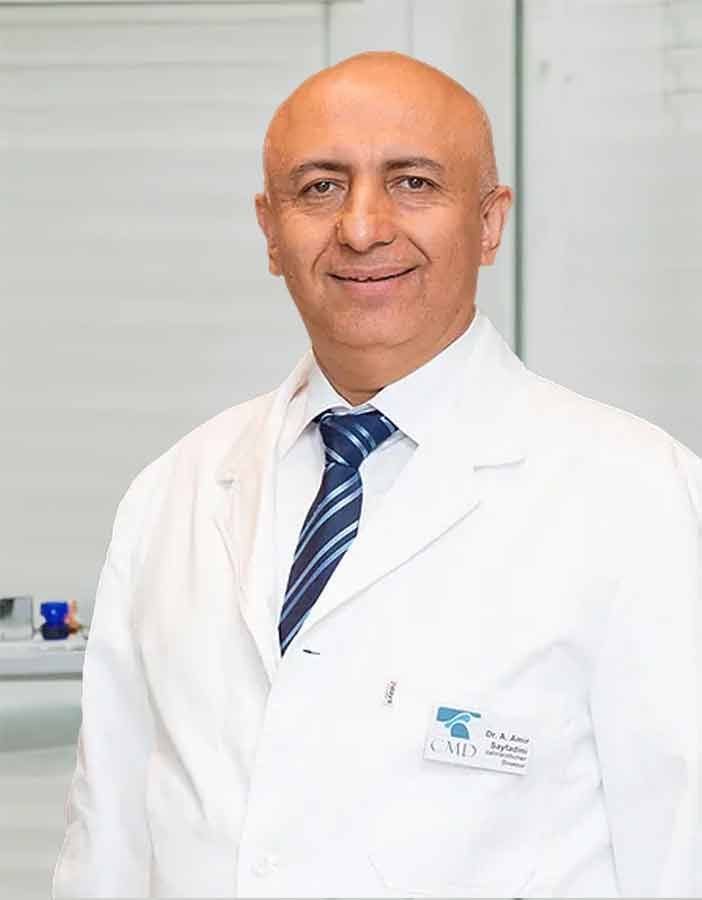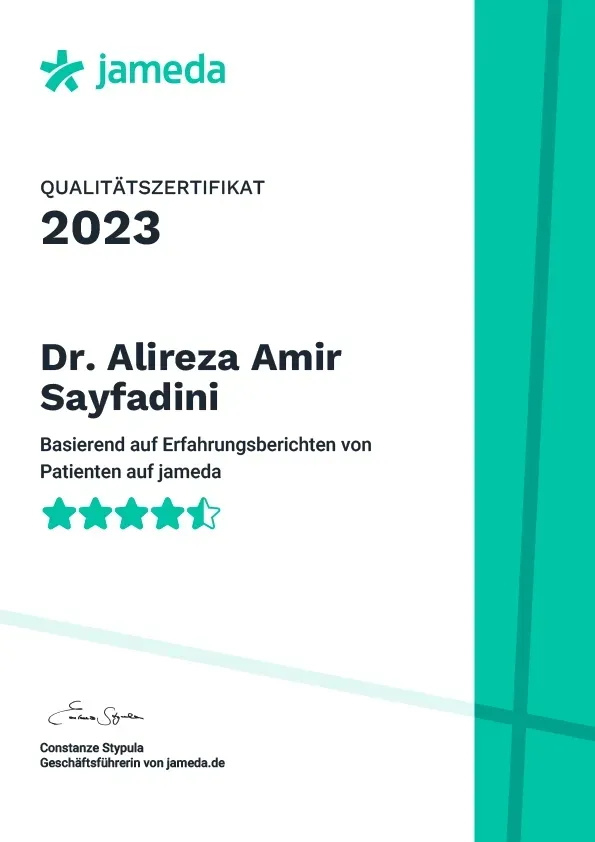Dr. A. Amir Sayfadini
Dental Director at the Dr. Amir CMD Center
Dr. A. Amir Sayfadini combines the highest level of professional expertise with state-of-the-art diagnostics and therapy. His focus is on the individualized and holistic treatment of TMJ disorder.

Dr. Amir, what motivated you to become a dentist and why did you choose your specialty?
The profession runs in our family. I grew up with it, as my father was a dentist himself. Today, my wife is also a dentist. We run our practice together, and it's nice to always be able to rely on your family, even in professional matters.
For the specialty CMD I have...
Personal interview
Vita
- 1979–1985 Medical studies (University of Shiraz/Iran)
- 1987–1993 Studied dentistry (Hannover Medical School)
- 1993–1999 Work as an employed dentist
- Since 1999, practicing dentist specializing in TMJ disorder
- Since 2008 Dental Director of the DR. AMIR CMD CENTRUM Hannover at the INI
- 30.11.2012 Completion of the Master's program at the University of Greifswald in "Dental Functional Analysis and Therapy with Computer Support"
Personal interview
Dr. Amir, what motivated you to become a dentist and why did you choose your specialty?
The profession runs in our family. I grew up with it, as my father was a dentist himself. Today, my wife is also a dentist. We run our practice together and it's nice to always be able to rely on your family, even in professional matters.
For the specialty TMJ disorder I have...
Read more
Dr. Amir, what motivated you to become a dentist and why did you choose your specialty?
The profession runs in our family. I grew up with it because my father was a dentist himself. Today, my wife is also a dentist. We both run our joint practice together and it's nice to always be able to rely on your family in professional matters.
I made a conscious decision to specialize in TMJ disorder because I was affected by this condition myself. I know what it means for our patients to experience severe discomfort and can therefore understand their inevitable limitations very well. It is simply a matter close to my heart to help others on their journey of suffering with TMJ disorder.
What is your specialty and what makes it so special?
TMJ disorder is the abbreviation for Temporomandibular joint disorders. This is caused by a misalignment of the temporomandibular joint. In Germany alone, it is estimated that around seven million people suffer from this complaint, which can cause symptoms throughout the body such as jaw clicking, restricted movement, headaches, dizziness, tinnitus or visual disturbances. Despite the large number of people affected, the condition is still largely unknown and is often overlooked by doctors. For some patients, this can mean a long odyssey from doctor to doctor. Our treatment concept at the DR. AMIR CMD CENTRUM Hannover straddles the boundary between medicine and dentistry. This is because a dental cause leads to a comprehensive medical problem. In order to be able to provide our patients with a holistic diagnosis and treatment, we need to have an optimal command of both disciplines. However, this is a challenge that we can master very well thanks to our expertise and interdisciplinary cooperation.
Is there a personal or medical role model that has particularly influenced your career?
My father was a great role model for me - not only as a person, but also as a dentist. When he practiced, however, the focus on Temporomandibular joint disorders in its current form did not yet exist. Nevertheless, he dealt a lot with this clinical picture and passed on his knowledge to me.
Another role model in my professional career is the internationally renowned founder and director of the International Neuroscience Institute (INI) in Hanover, Professor Madjid Samii. He taught me what it means to work in an interdisciplinary way and what challenges can be overcome with a good network of colleagues working together. He is a brilliant neurosurgeon and networker.
Are there any current aids or innovations that make your day-to-day work at the practice easier?
In addition to a manual analysis, we naturally also examine and treat our patients with professional equipment. In our DR. AMIR CMD CENTRUM Hannover, we always work with the latest technology at a world-leading level - both in general diagnostics and in functional diagnostics. The continuous further training of our specially trained team is of course a basic requirement in our practice.
Where do you see the greatest challenges for the future in your field?
Interdisciplinary cooperation is the keyword that I cannot emphasize enough. Interdisciplinary cooperation between doctors is essential, especially in specialist areas such as TMJ disorder. Disease patterns that involve such extensive symptoms and complaints must be viewed from different angles. However, clearly defining these interfaces in practice and using them effectively is a major challenge both today and in the future. That is why this treatment approach is so important to me and one of our core competencies at the DR. AMIR CMD CENTRUM Hannover.
I hope that this mostly unknown widespread disease will become more present in people's minds - both among doctors and among those affected themselves. Because patients can be helped, but unfortunately they often don't know what to do with their problems. This urgently needs to change!
What is particularly appreciated about your individual approach to your patients?
One of the unique selling points of my work and that of my team is not only the interdisciplinary collaboration between different experts, but also quite simply our professional expertise. TMJ disorder and TMJ therapy may be listed as services by many doctors, but really understanding and being able to treat this clinical picture requires more than just basic knowledge. Our patients seek out specialized experts whom they can trust completely. Because we also see the stories behind those affected and include them in our considerations for an optimal and individually tailored therapy. Whether you have anxiety or not, we always treat everyone with empathy, patience and understanding. Together, we experience many wonderful moments in our practice and are always happy for our patients when treatment is successful. That's exactly why we love our profession!
What do you particularly appreciate about your patients?
As TMJ disorder specialists, we are often at the very end of the diagnostic chain. In most cases, our patients have already consulted doctors from other specialties many years before without receiving a satisfactory answer to their problems or even a successful treatment. We are always very pleased when they place all their trust in us once again, come to us with high expectations and we are then able to fulfill them. Helping an almost hopeless patient to regain a pain-free quality of life is a great feeling. This relief is then naturally transferred to me and my team after successful therapy.
That's exactly what I like about my job and my patients, who quickly grow close to my heart.
Is there a special patient experience that you will never forget?
It's hard to think of just one patient experience in our day-to-day practice. We experience every day what it means to endure years of suffering from TMJ disorder. We experience the severe symptoms that patients have to deal with until the correct diagnosis is finally made. The stories we hear are very often characterized by despair and hopelessness. Of course, this doesn't leave you cold and that's a good thing. We really value the personal relationship we build with our patients and take it as an incentive every day to help them as quickly and effectively as possible.
What health tip would you like to pass on to patients?
Keep at it! Please never give up looking for the solution to your health problems. Because there are more interrelated symptoms in our bodies than you might think.
And finally, a general tip: exercise, exercise, exercise! In modern medicine, lack of exercise is already defined as a kind of illness. Don't give it a chance!


